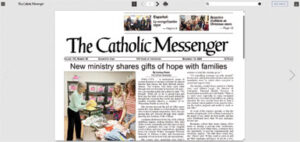St. John Chrysostom, a doctor of the Church (347-407 CE), said, “Not to enable the poor to share in our goods is to steal from them and deprive them of life. The goods we possess are not ours but theirs” (Catechism of the Catholic Church, no. 2446). Food for thought as we journey through Lent participating in the three practices of prayer, fasting and almsgiving while our elected officials are considering legislation that would adversely affect children and adults who depend on Medicaid and SNAP.
The Iowa House introduced a bill Feb. 27 that creates work requirements for some Medicaid recipients (House Study Bill 248), 75% of whom are already working! The proposed law “would affect 180,000 members of the Iowa Health and Wellness Plan, which is the ‘Medicaid expansion’ population,” according to the Iowa Catholic Conference ICC Newsletter, March 1.
“The Catholic Church certainly values the dignity of work,” the ICC points out. Those Medicaid recipients who are not working “often face barriers such as lack of education, struggles with mental health, substance abuse or a criminal conviction. These same Iowans would likely have difficulty navigating the new reporting requirements.”
These requirements would apply also to recipients of the Supplemental Nutrition Assistance Program (SNAP). Under the proposed legislation, Iowa would end the Medicaid expansion program if the federal government does not allow the requirements, says the ICC, the public policy voice of Iowa’s Catholic bishops.
Able Bodied Adults Without Dependents (ABAWDs) ages 18-54 already must work at least 20 hours per week or face a three-month time limit to participate in SNAP, the Iowa Hunger Coalition reports. The proposed bill would expand the requirements to adults ages 55-64, caretakers of children ages 6 and up, veterans, people experiencing homelessness and young adults who have aged out of foster care.
Altogether, 274,333 children and adults in 136,894 households received SNAP benefits in Iowa in fiscal year 2022, according to the U.S. Department of Agriculture Food and Nutrition Service. Of those households, 72% had income at or below the poverty line and 35% had income from wages or work. The ICC has registered opposition to this bill.
In addition to the above restrictions, SNAP recipients — from babies to senior citizens — face a restriction that seems punitive rather than positive as Iowa legislators consider a measure aimed at encouraging healthy eating among the poor. This bill, tied to expansion of the Double Up Food Bucks program, would severely curtail the food choices of SNAP recipients.
Both the Iowa Senate and House have proposed legislation that would allocate $1 million to expand the Double Up Food Bucks program to allow SNAP recipients to double their purchasing power on fruits and vegetables. However, the House version includes a dismaying exception: the requirement that “the Iowa Department of Health and Human Services requests, and is granted, a waiver from the U.S. Department of Agriculture to limit eligible foods,” according to Iowa Capital Dispatch (2-26-25).
SNAP recipients could purchase only food on the Women, Infants and Children (WIC) approved food list as well as “real” meat, dairy and eggs, bread, grains, fruits, vegetables, cereal, peanut butter, nuts, pasta, rice and legumes, the Iowa Hunger Coalition says. The list of forbidden foods is much longer and includes olive oil, vegetable oil and other cooking oils, spices, seasonings and condiments, frozen prepared foods, pumpkin, sunflower and other seeds. Families can make spaghetti, but would have to prepare the sauce from scratch. How many busy families have time to make sauce from scratch? Why are we discouraging SNAP recipients from growing food-producing plant seeds?
This Lenten season offers an opportunity to incorporate our practices of prayer, fasting and almsgiving to respond to the unfolding challenges of legislation that would be detrimental to the health and wellbeing of children and adults who are poor.
- Pray — for our elected and appointed officials — state and federal — to advance legislation that ensures people who depend on Medicaid and SNAP receive the benefits they need to thrive.
- Fast — from impugning people who depend on these benefits or suspecting them of cheating the system. Research unbiased, balanced organizations such as the Iowa Catholic Conference (iowacatholicconference.org), the U.S. Conference of Catholic Bishops (usccb.org) and federal agencies, such as the USDA Food and Nutrition Service (https://tinyurl.com/mubnta2c) and Healthcare.gov that operate these programs to assess their efficacy.
- Give alms. Do so by giving of your time to advocate in writing, by phone or in person for programs and legislation that prioritize the needs of the poor first, as Catholic Social Teaching instructs. Visit the ICC website
(iowacatholicconference.org) to learn about the status of issues and to participate in action alerts addressed to our legislators. Contact members of congress (congress.gov) to share your concerns and ask them for their views on Medicaid and SNAP and the reasons for their views.
“He who has the goods of this world and sees his brother in need and closes his heart to him, how does the love of God abide in him?” (1 Jn 3:17)
Barb Arland-Fye, Editor
arland-fye@davenportdiocese.org










